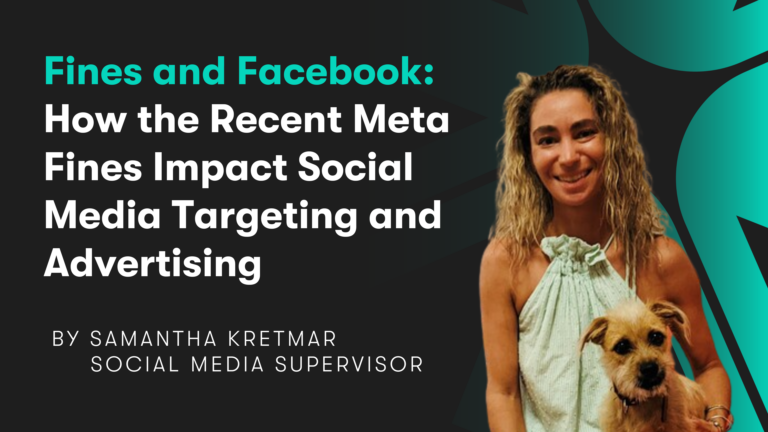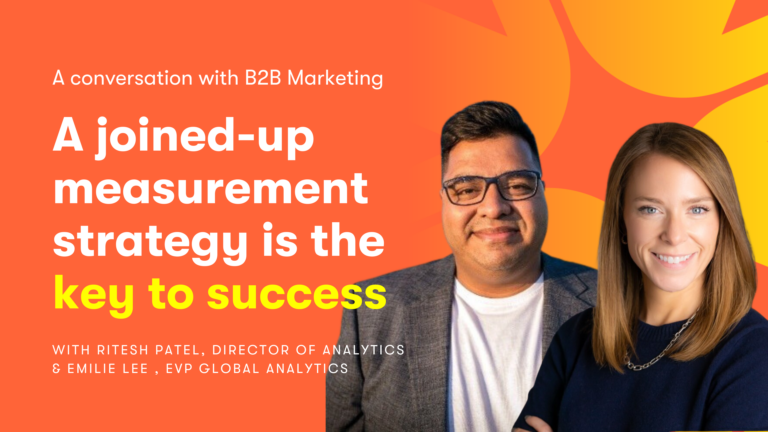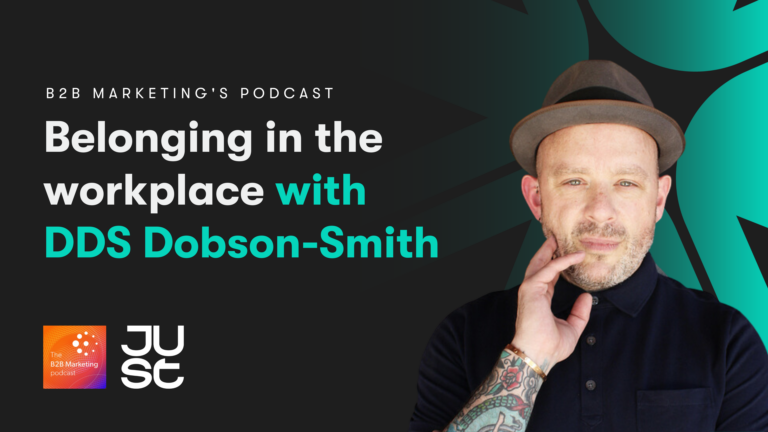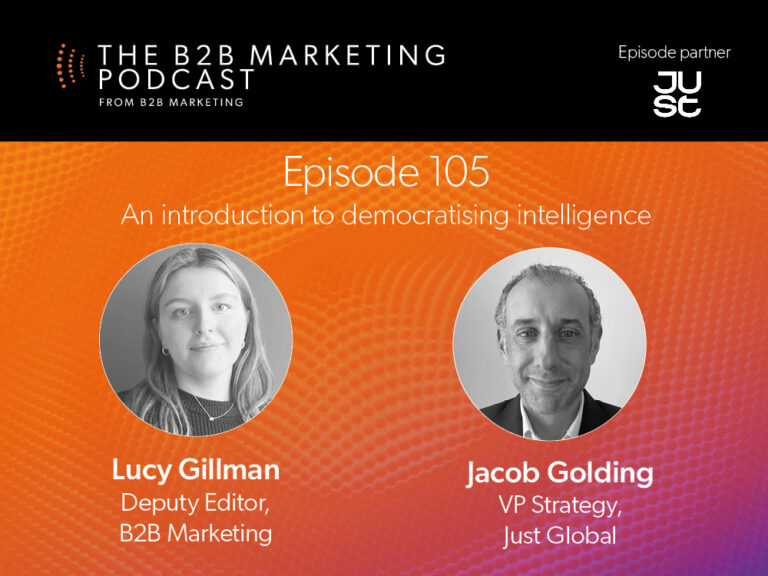Just Global’s VP of Strategy, Jacob Golding, discusses why sharing intelligence across your organization can give you a competitive advantage
Just Global’s Jacob Golding (JG) recently took part in a podcast, ‘An introduction to democratizing intelligence with Jacob Golding’ with B2B Marketing’s Deputy Editor Lucy Gilman (LG).
This episode will walk you through everything you need to know, from the benefits and the steps to implement it, to what reporting looks like and how things change on a global scale.
LG: We’re here to talk about democratizing intelligence. Before we get into the nitty-gritty, could you tell us how it came to be?
JG: Marketers’ big focus is to understand the mercurial aspects of their customers and evangelize how buying decisions are made. There are silos in every organization and every business, and the challenge is to break them down. We can do this by providing the methods, tools, and frameworks and then think about how decisions are made. Within that, a democratization process happens, which leads to in-the-moment decision-making.
LG: The practice of sharing intelligence across your organization sounds simple in theory, but it’s not something we’re proactively doing in B2B. Why?
JG: It’s important to take a longer view of what data is telling us and what intelligence is informing us. Making small decisions that are connected between marketing and sales, versus larger strategic decisions around how we position our solution, platforms, and technologies in the market is key, and gives clients a competitive advantage. It’s not just about what the customer is telling us – it’s about connecting the dots in the longer term.
LG: You mentioned gaining a competitive advantage. What are some of these advantages of democratizing intelligence?
JG: From a B2B perspective, one of the core areas is to gain audience clarity. Often clients need to have a better understanding of who their customers are and the accounts they need to be closing. The competitive advantage happens when clients close more effectively and develop a synergy between marketing and sales.
LG: Do you think people in B2B truly know who their customers are?
JG: Yes, but then the qualifying aspect is working out who is the best customer for your solution. Sales want to target thousands of accounts, but marketing needs to know who the ICP is. Prioritizing who they need to be talking to as a brand is paramount. If a client has landed a customer, how do they capture a greater share of wallet? We need to look for the patterns in the intelligence we have that help us focus our efforts and energies to have a greater return.
LG: What are some of the common challenges when it comes to democratizing intelligence and how can they be overcome?
JG: Having a shared understanding of what a good account and customer look like is key. Marketing has one idea, sales another. What’s the difference between the two? The customer doesn’t see the difference. Transformational leaders need to rally folks around a common understanding, a common language, and a common appreciation of who those customers are, and how they’re making the right buying decisions so that they can have a bigger impact on the world.
LG: Tell us more about the reporting side of democratizing intelligence, and how that works. What are the best practices?
JG: It’s asking each person and group what success looks like. Sales need to see data from an account perspective, not a regional perspective. Marketers need to look at regional and key accounts, so being able to map that is the reporting aspect. What’s happening outside the organization? How are we capturing that knowledge? Being able to harness that intent and behavioral data is key.
LG: This goes back to what you were saying about a mindset change within an organization.
JG: Yes. I’ve seen a huge shift in how we see the world. B2B is very complex. How do we distill it down to make it simple? Here at Just Global we’re driving that spark, and being that challenging advocate while helping folks work harder and smarter in the process.
LG: Would you agree that democratizing intelligence is harder to implement on a global scale than it is for smaller local companies? How do things play out on a national stage?
JG: Thinking about global marketing, there are different frameworks that organizations use. We work hard internally to have centers of excellence where it’s not just within a department, but across teams. We share and talk about the intelligence we have, and what we’re seeing in the market. We’re asking ourselves what the answers to questions are before our clients ask us about them. This enables us to lead, be strong, and be dynamic.
LG: What advice would you give to companies wanting to start this democratizing journey? What are the first steps, and what questions should they be asking themselves?
JG: One of the first steps is looking at where you need to be as a business in the next 12 months. Then ask whether there’s a smarter way of working. Looking at your marketing and marketing communications, as well as the data that’s supporting it, is the first step. Then you need to work out whether the tools, services, and frameworks you deploy are doing the right job for your organization, or whether they need to change. If they’re living, breathing, and changing based on what’s happening in the market – that’s tremendous. If they’re not, the story will dry up, because there’s nothing to make it fresh and exciting.
LG: If you had to define democratizing intelligence success in one word, what would that word be?
JG: Empowerment. Empowering people to make the right decisions and the right moments that drive an opportunity, to gain a competitive advantage is key. Think about a lateral approach across your organization, so decisions can be made in a joined-up way. There’s a cause and effect in action, so people must understand that cause and effect. And also, the benefit to the customer because at the end of the day that value will come back to the brand over time.
To find out how a democratized intelligence strategy can benefit your business, contact us now.

Just Global Social Media Supervisor, Samantha Kretmar, explains the impact of recent Meta fines.

Just Global’s Emilie Lee and Ritesh Patel sit down with B2B Marketing to discuss how to adopt an integrated measurement strategy.

Just Global’s very own DDS sits down with B2B Marketing during their latest podcast episode to discuss belonging in the workplace.

